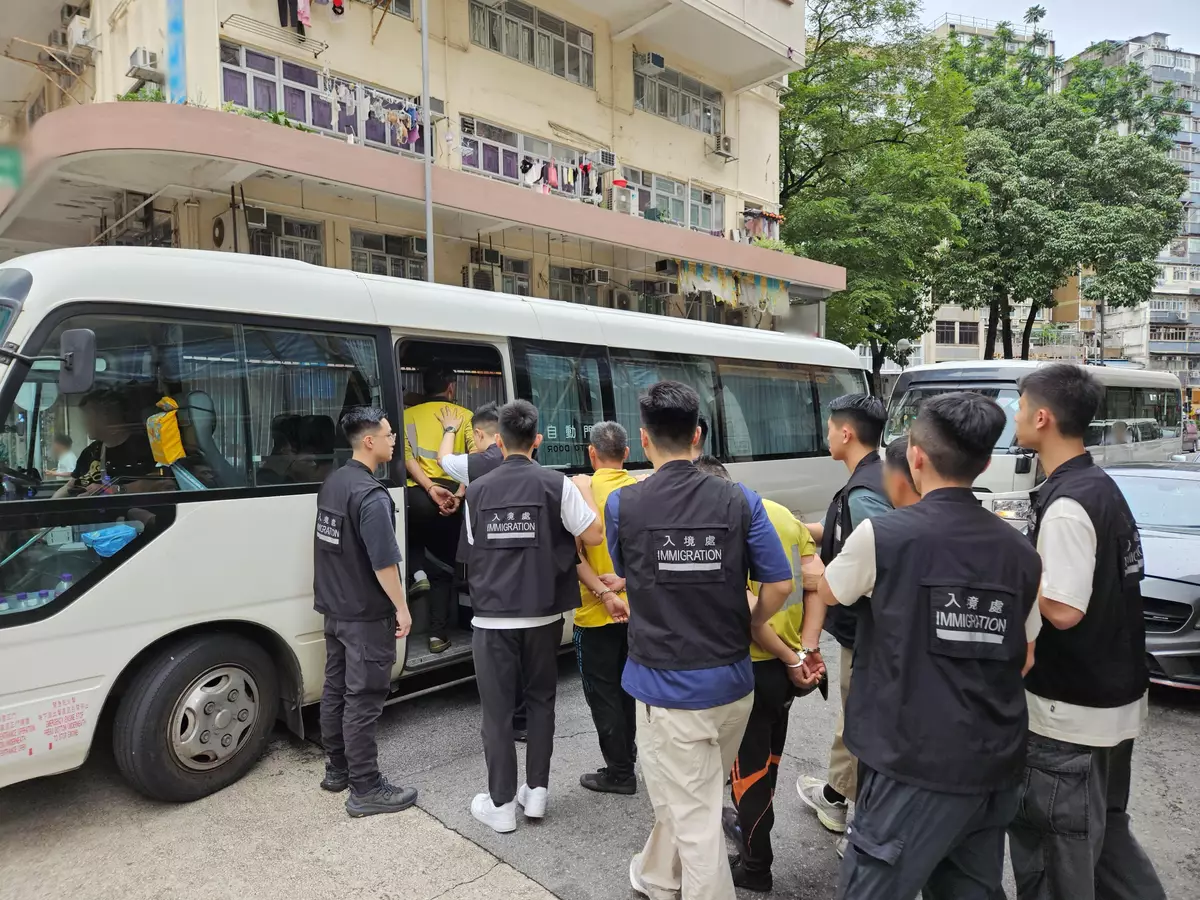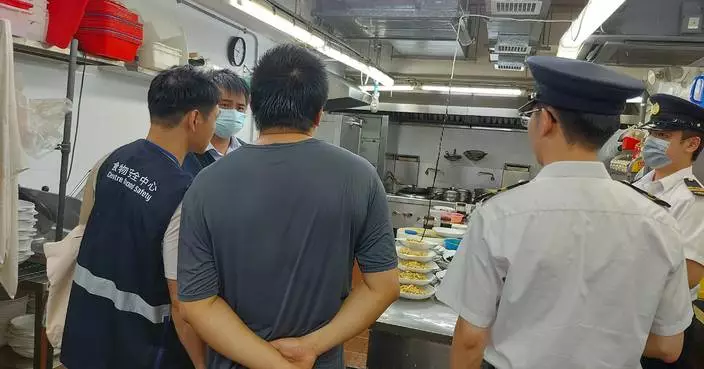Twenty-five persons arrested during anti-illegal worker operations
The Immigration Department (ImmD) mounted a series of territory-wide anti-illegal worker operations codenamed "Lightshadow" and "Twilight", and joint operations with the Hong Kong Police Force codenamed "Champion" and "Windsand", for four consecutive days from August 19 to yesterday (August 22). A total of 20 suspected illegal workers, four suspected employers and one illegal immigrant were arrested.
During the anti-illegal worker operation, ImmD Task Force officers raided 44 target locations including premises under renovation and restaurants. Eighteen suspected illegal workers and four suspected employers were arrested. The arrested suspected illegal workers comprised nine men and nine women, aged 23 to 52. Among them, one man was a holder of recognisance form, which prohibits him from taking any employment. Three men and one woman, aged 25 to 59, were suspected of employing the illegal workers and were also arrested.
During operation "Champion", enforcement officers raided 61 target locations in Hung Hom, Kowloon City and Western District. Two suspected illegal workers and one illegal immigrant were arrested. The arrested suspected illegal workers comprised one man and one woman, aged 55 and 52. The woman was also suspected of using and being in possession of a forged Hong Kong identity card. Furthermore, one female illegal immigrant, aged 47, was arrested.Among them, one suspected illegal worker was handled by the ImmD.
An ImmD spokesman said, "Any person who contravenes a condition of stay in force in respect of him or her shall be guilty of an offence. Also, visitors are not allowed to take employment in Hong Kong, whether paid or unpaid, without the permission of the Director of Immigration. Offenders are liable to prosecution and upon conviction face a maximum fine of $50,000 and up to two years' imprisonment. Aiders and abettors are also liable to prosecution and penalties."
The spokesman warned, "As stipulated in section 38AA of the Immigration Ordinance, an illegal immigrant, a person who is the subject of a removal order or a deportation order, an overstayer or a person who was refused permission to land is prohibited from taking any employment, whether paid or unpaid, or establishing or joining in any business. Offenders are liable upon conviction to a maximum fine of $50,000 and up to three years' imprisonment. Under the prevailing laws, it is an offence to use or possess a forged Hong Kong identity card or a Hong Kong identity card related to another person. Offenders are liable to prosecution and upon conviction face a maximum fine of $100,000 and up to 10 years' imprisonment."
The spokesman reiterated that it is a serious offence to employ people who are not lawfully employable. Under the Immigration Ordinance, the maximum penalty for an employer employing a person who is not lawfully employable, i.e. an illegal immigrant, a person who is the subject of a removal order or a deportation order, an overstayer or a person who was refused permission to land, has been significantly increased from a fine of $350,000 and three years' imprisonment to a fine of $500,000 and 10 years' imprisonment to reflect the gravity of such offences. The director, manager, secretary, partner, etc, of the company concerned may also bear criminal liability. The High Court has laid down sentencing guidelines that the employer of an illegal worker should be given an immediate custodial sentence.
According to the court sentencing, employers must take all practicable steps to determine whether a person is lawfully employable prior to employment. Apart from inspecting a prospective employee's identity card, the employer has the explicit duty to make enquiries regarding the person and ensure that the answers would not cast any reasonable doubt concerning the lawful employability of the person. The court will not accept failure to do so as a defence in proceedings. It is also an offence if an employer fails to inspect the job seeker's valid travel document if the job seeker does not have a Hong Kong permanent identity card. Offenders are liable upon conviction to a maximum fine of $150,000 and to imprisonment for one year. In that connection, the spokesman would like to remind all employers not to defy the law by employing illegal workers. The ImmD will continue to take resolute enforcement action to combat such offences.
Under the existing mechanism, the ImmD will, as a standard procedure, conduct an initial screening of vulnerable persons, including illegal workers, illegal immigrants, sex workers and foreign domestic helpers, who are arrested during any operation with a view to ascertaining whether they are trafficking in persons (TIP) victims. When any TIP indicator is revealed in the initial screening, the ImmD officers will conduct a full debriefing and identification by using a standardised checklist to ascertain the presence of TIP elements, such as threats and coercion in the recruitment phase and the nature of exploitation. Identified TIP victims will be provided with various forms of support and assistance, including urgent intervention, medical services, counselling, shelter or temporary accommodation and other supporting services. The ImmD calls on TIP victims to report crimes to the relevant departments immediately.

Twenty-five persons arrested during anti-illegal worker operations Source: HKSAR Government Press Releases
CHP appeals for heightened vigilance against invasive Group B Streptococcus
The Centre for Health Protection (CHP) of the Department of Health today (September 13) appealed to members of the public for heightened vigilance against invasive Group B Streptococcus and in particular, urged them to pay attention when touching or handling raw freshwater fish and should wear gloves, as well as not to consume undercooked freshwater fish.
Hong Kong has recorded in 2021 summer (between September and October) a cluster of more than 50 cases of Group B Streptococcus, belonged to serotype III sequence type 283 (ST283). The then investigation found that the infections were associated with contact of raw freshwater fish or consumption of undercooked freshwater fish. The CHP subsequently enhanced surveillance on the relevant cases with the Hospital Authority (HA). The recent surveillance data revealed an upward trend in the number of in-patients tested positive for invasive Group B Streptococcus during last month and September 11. The CHP immediately conducted further laboratory analysis of the cases in collaboration with the HA and the preliminary result showed that 27 of the cases were ST283. The CHP's analysis of some of the samples is still in progress and it cannot rule out that the number of cases will further increase.
The CHP's epidemiological investigations showed that the 27 patients with ST283 infections involved ten males and 17 females, aged between 53 and 88 (median: 70), residing in 18 districts throughout the territory, with no district clustering identified. Among them, 20 patients have underlying illness. The patients mainly presented with sepsis (15 patients), joint abscess (nine patients), meningitis (two patients) and urinary tract infection (one patient). The HA's information showed that among the 27 patients, five have been discharged, 17 hospitalised patients are in stable condition, three in serious condition and the other two passed away. The CHP is obtaining further information on the cause of death from HA.
The CHP also conducted an in-depth investigation on the exposure history of individual patients prior to the onset of the disease in order to identify the possible sources of infection. It was found that about 90 per cent of the patients had contact with or handled raw freshwater fish, prior to the onset of their disease. Seven of them reported that they had wounds on their hands when handling raw freshwater fish, but no infected person reported that they had consumed freshwater fish sashimi. Based on the above information, the CHP considered that the cause of infection was related to the handling of or contact with raw freshwater fish (especially with wound on the hands).
In addition, investigations revealed that 19 patients had been to freshwater fish stalls in markets and contacted freshwater fish, which involved 14 markets located in different districts. The personnel of the CHP had inspected markets where some of the patients had visited and wholesale fish markets supplying live fish to conduct epidemiological investigations. A total of 71 relevant workers have been monitored and no symptomatic worker found. The CHP has provided health education to the workers and will continue to monitor health conditions of workers of other fish stalls. During the investigations, it was identified that the ST283 isolates of environmental and fish samples collected from a retail freshwater fish stall inside the Shek Wu Hui Market is identical to those found in some patients. For prudence's sake, the Food and Environmental Hygiene Department (FEHD) has arranged thorough cleansing and disinfection for all freshwater fish stalls inside Shek Wu Hui Market. The investigations of the CHP are ongoing.
The CHP, the FEHD and the Agriculture, Fisheries and Conservation Department (AFCD) held a joint meeting today to review the relevant situation. The FEHD's personnel will inspect all fish stalls, licensed Fresh Provision Shops and Permitted Premises selling freshwater fishin Hong Kong, provide education on hygiene to relevant workers and request them to strengthen cleaning and disinfection work at the premises. The FEHD conducts thorough cleaning at each public market every day and will pay special attention to the hygiene condition in the vicinity of freshwater fish stalls in the markets. Separately, the AFCD confirmed no abnormality has been observed regarding freshwater fish in wholesale fish markets and will continue to monitor the condition of live fish.
"Literature reported that ST283 exists in freshwater fish, especially in Southeast Asia countries, and with seasonal pattern. Association between invasive Group B Streptococcal infection of ST283 and consumption of raw freshwater fish was also reported in overseas literature," a spokesman for the CHP said.
"Members of the public shall wear gloves when touching or handling raw freshwater fish. If symptoms such as inflamed wound and fever develop, they should seek medical attention promptly. Meanwhile, the public should refrain from consuming undercooked freshwater fish," a spokesman for the CHP reminded.
The CHP will issue a letter to doctors to enhance their alertness for Group B Streptococcus infection cases. The CHP will continue to provide advice to members of the public through different channels to minimise the infection risk and work together with relevant departments to enhance publicity, especially health education related to wound care and consumption of freshwater fish.
A spokesman for the FEHD said that in order to protect public health, freshwater fish sashimi is a prohibited food item under the Food Business Regulation (Cap. 132X) in Hong Kong.
To prevent Group B Streptococcus (ST283) infection, members of the public are reminded to maintain personal, food and environmental hygiene and should keep their hands clean and practice good wound care at all times, especially:
To minimise the infection risks, workers of aquatic products or restaurants must wear gloves when handling aquatic products and avoid direct contact with aquatic products or dirty water with bare hands;
When buying aquatic products, the public must avoid direct contact with the aquatic products or use any towel provided by the stalls. They should wash hands with liquid soap and water as soon as possible if having contact with aquatic products which are not fully cooked. When handling aquatic products at home, the public should also wear gloves and wash hands thoroughly afterwards;
Members of the public must not eat any freshwater fish sashimi, raw or undercooked freshwater aquatic products. When consuming hot pot food or congee items which consist of aquatic products, they should ensure that the food is thoroughly cooked in which the centre of the food should reach a temperature of at least 75 degrees Celsius so as to destroy pathogen; and
People must not touch aquatic products directly whenever there is a wound on hands. If a wound is sustained during handling aquatic products, the wound must be cleaned immediately and properly covered with waterproof adhesive dressings. Individuals should seek medical advice promptly when wound infection is found.
The public may visit the CHP's Invasive Group B Streptococcus Infection associated with Sequence Type 283 (ST283) page for more information.

Source: AI-generated images











